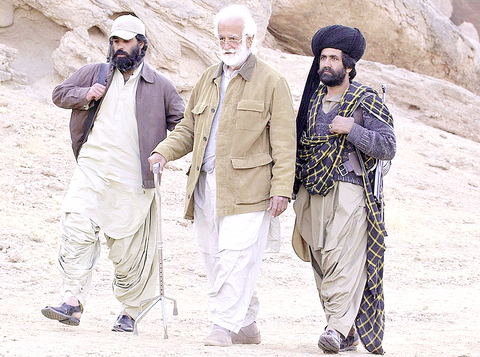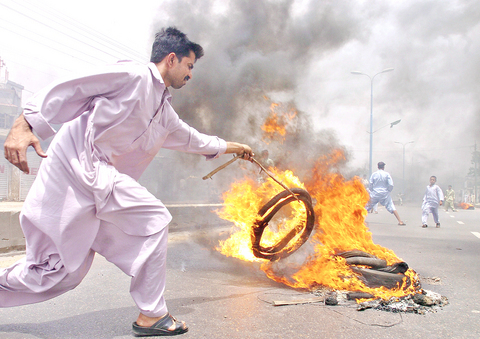Police arrested 450 rioters who rampaged through the city of Quetta yesterday in defiance of a curfew to protest the Pakistani military's overnight killing of a prominent rebel tribal chief, a top police official said.
Rioting in different parts of the Baluchistan provincial capital flared for a second straight day, with angry mobs burning shops, banks and police vehicles in response to Saturday's killing of the fugitive ethnic-Baluch leader, Nawab Akbar Bugti.
Government forces killed the silver-bearded Bugti, 79, and at least 24 of his supporters during a raid on his cave hideout in the mountainous Kohlu area, about 220km east of Quetta. Bugti went into hiding late last year after an attempt was made on the Pakistani president's life.

PHOTO: AFP
Quetta police chief Suleman Sayed said that 450 people were arrested yesterday in Quetta as security forces tried to crack down on the violence spreading through the city, which was placed under a round-the-clock curfew.
"All forces have been put on alert," Information Minister Mohammed Ali Durrani told the privately run Geo TV.
Bugti's son-in-law, Shahid Bugti, a senator in Pakistan's parliament, denounced the killing of the popular tribal chief and demanded the government return his body so his family could bury him.

PHOTO: AFP
"This is a very tragic affair for the whole family, the tribe and the people of the whole region," Shahid Bugti said from his father-in-law's family house in Quetta. "We consider him a martyr. He led a very graceful life and he had a graceful death, going out while fighting for his people's rights."
Baluchistan has been wracked by decades of low-level conflict, which has often flared into large-scale clashes, as ethnic-Baluch tribespeople led by Bugti pressed the government for an increased share of the wealth gained from natural resources extracted from the province, including gas, oil and coal.
Violence yesterday also spread to throughout Baluchistan and to the southern port of Karachi, Pakistan's largest city and capital of neighboring Sindh Province, where large numbers of Baluch people pelted cars with stones and set tires alight, police said. Extra numbers of police and paramilitary forces have been deployed to Karachi's streets.
Security forces attacked Bugti and up to 80 of his supporters in a cave hide-out following an intercept of a satellite phone call in Kohlu district, said a top security official, who declined to be named because of the sensitive nature of the topic.

Drug lord Jose Adolfo Macias Villamar, alias “Fito,” was Ecuador’s most-wanted fugitive before his arrest on Wednesday, more than a year after he escaped prison from where he commanded the country’s leading criminal gang. The former taxi driver turned crime boss became the prime target of law enforcement early last year after escaping from a prison in the southwestern port of Guayaquil. Ecuadoran President Daniel Noboa’s government released “wanted” posters with images of his face and offered US$1 million for information leading to his capture. In a country plagued by crime, members of Fito’s gang, Los Choneros, have responded with violence, using car

CYBERCRIME, TRAFFICKING: A ‘pattern of state failures’ allowed the billion-dollar industry to flourish, including failures to investigate human rights abuses, it said Human rights group Amnesty International yesterday accused Cambodia’s government of “deliberately ignoring” abuses by cybercrime gangs that have trafficked people from across the world, including children, into slavery at brutal scam compounds. The London-based group said in a report that it had identified 53 scam centers and dozens more suspected sites across the country, including in the Southeast Asian nation’s capital, Phnom Penh. The prison-like compounds were ringed by high fences with razor wire, guarded by armed men and staffed by trafficking victims forced to defraud people across the globe, with those inside subjected to punishments including shocks from electric batons, confinement

The team behind the long-awaited Vera Rubin Observatory in Chile yesterday published their first images, revealing breathtaking views of star-forming regions as well as distant galaxies. More than two decades in the making, the giant US-funded telescope sits perched at the summit of Cerro Pachon in central Chile, where dark skies and dry air provide ideal conditions for observing the cosmos. One of the debut images is a composite of 678 exposures taken over just seven hours, capturing the Trifid Nebula and the Lagoon Nebula — both several thousand light-years from Earth — glowing in vivid pinks against orange-red backdrops. The new image

Canada and the EU on Monday signed a defense and security pact as the transatlantic partners seek to better confront Russia, with worries over Washington’s reliability under US President Donald Trump. The deal was announced after a summit in Brussels between Canadian Prime Minister Mark Carney and European Commission President Ursula von der Leyen and European Council President Antonio Costa. “While NATO remains the cornerstone of our collective defense, this partnership will allow us to strengthen our preparedness ... to invest more and to invest smarter,” Costa told a news conference. “It opens new opportunities for companies on both sides of the